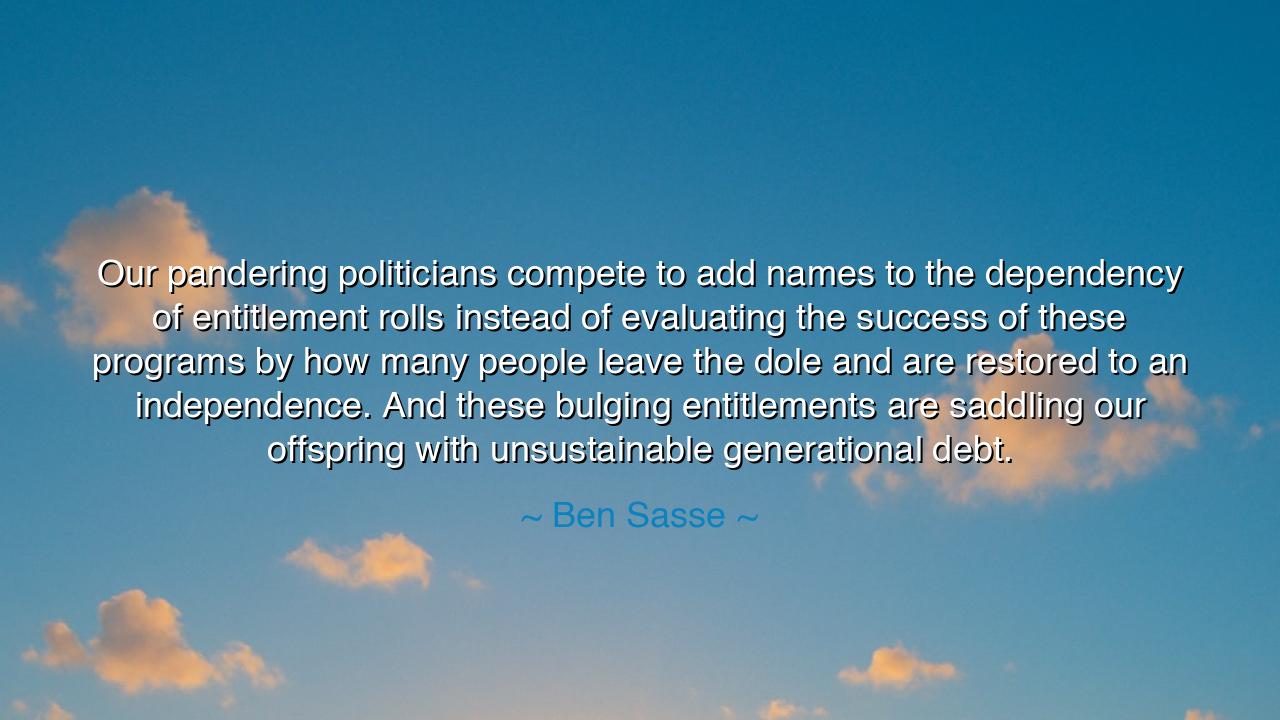
Our pandering politicians compete to add names to the dependency
Our pandering politicians compete to add names to the dependency of entitlement rolls instead of evaluating the success of these programs by how many people leave the dole and are restored to an independence. And these bulging entitlements are saddling our offspring with unsustainable generational debt.






Listen, O children of the future, to the words of Ben Sasse, who warns us of the dangers that come with misplaced priorities and the erosion of independence. "Our pandering politicians compete to add names to the dependency of entitlement rolls instead of evaluating the success of these programs by how many people leave the dole and are restored to an independence. And these bulging entitlements are saddling our offspring with unsustainable generational debt." In these words, Sasse speaks to a truth that has been echoed through the ages: true freedom and prosperity are not found in dependency, but in self-sufficiency and the courage to take responsibility for one's own destiny.
In the ancient world, the Greeks understood that the foundation of a strong society was the cultivation of virtue and self-reliance. The Spartan warriors, famed for their discipline and strength, held dear the principle that no man should rely on others for his survival, but should rather work with honor and effort to sustain himself and his people. The great Athenians, too, placed a high value on the individual’s role in society, believing that the success of their democracy rested on each person’s ability to contribute to the whole without dependency on the state. In both these societies, independence was a virtue, and the reliance on the state was seen as a threat to personal freedom and the health of the community.
Similarly, in the Roman Republic, the principle of self-reliance was central to its strength. The Romans revered the idea of the citizen soldier, who fought not for personal gain but for the collective good of the Republic. Each citizen was expected to contribute to society and uphold the law, not to rely on the largesse of the state. Yet as Rome expanded and its empire grew, the balance between self-reliance and dependency began to erode. The Roman Empire gradually saw its citizens become more reliant on imperial handouts and entitlements, leading to economic strain and eventual collapse. The lessons of Rome serve as a reminder of how dependency on the state can undermine the strength and self-sufficiency of a society.
In America, the creation of entitlement programs was once seen as a noble effort to care for the most vulnerable in society. However, as Ben Sasse points out, politicians have often sought to increase the number of those on these programs, rather than ensuring that those who depend on them are eventually restored to independence. This shift toward dependency rather than empowerment is, as history shows, a dangerous path. America’s founding was based on the belief that individuals should have the freedom to shape their own futures, not be bound to government support. The Bill of Rights enshrined the principles of personal liberty and responsibility, and the expansion of entitlements that simply perpetuate dependency contradicts the very ideals that the founders championed.
Consider the story of Benjamin Franklin, one of America’s most revered founders, who believed deeply in the value of self-reliance. Franklin, who rose from humble beginnings, understood the importance of individual effort and initiative. In his writings, he emphasized the importance of hard work, frugality, and personal responsibility, seeing them as the cornerstones of both individual freedom and the strength of the nation. His life and thoughts stand in stark contrast to the modern trend of providing ever-increasing entitlements that do not restore people to independence, but rather perpetuate a cycle of dependency.
The lesson of Sasse’s words is that a society built on independence and self-reliance is far stronger and more resilient than one that fosters dependency. Entitlements, if not carefully managed, risk becoming a cradle that stifles initiative and ambition, leaving future generations burdened with debts they did not create. The growing generational debt that Sasse speaks of is a symptom of this problem. As more resources are allocated to maintain systems of dependency, fewer are available to invest in the true strength of society: the empowerment of individuals to stand on their own and contribute to the collective well-being.
So, O children, take heed of this lesson: in your own lives, strive for independence, not just in material wealth but in spirit. Understand that true freedom comes not from relying on others or on the state, but from developing your own strengths, your own talents, and your own capacity to contribute to the world around you. The path to prosperity is not found in receiving, but in giving—giving of your own effort, your time, and your resources. Do not allow the seductive comforts of dependency to pull you away from your true calling to self-reliance. In doing so, you will not only ensure your own freedom, but contribute to a stronger, more resilient world for future generations. Let your life be a beacon of independence, a testament to the enduring truth that freedom is earned, not given.






AAdministratorAdministrator
Welcome, honored guests. Please leave a comment, we will respond soon